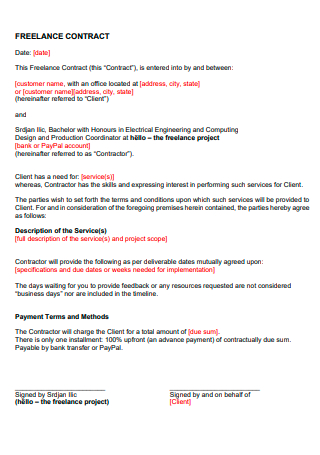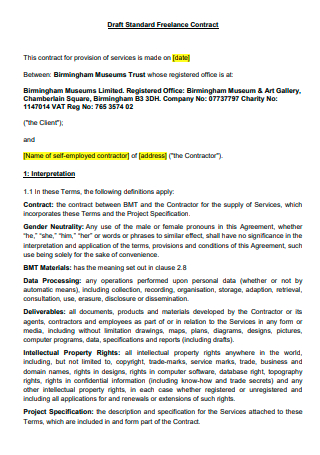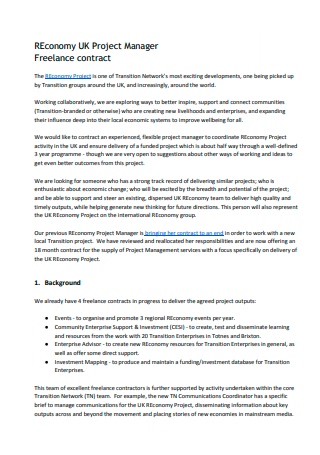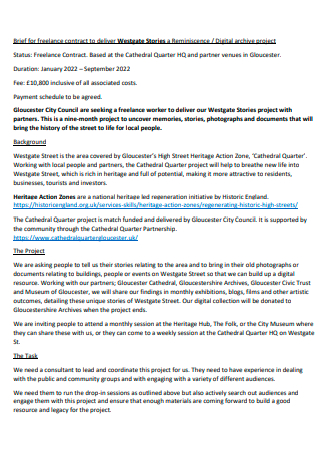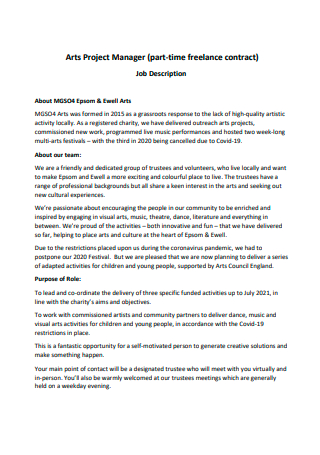4+ Sample Freelance Project Contract
What is a Freelance Project Contract?
A freelance project contract is a binding document for two parties which are the client and the freelancer about doing a certain project. The client will get the service of the freelancer and the contract is needed to ensure that the project will be executed well. The contract contains all the details about the project. It has clauses that dictate the terms for the project. A freelancer or an independent contractor engages in this kind of contract for his or her project. If the freelancer is a writer, he or she can enter into a freelance writer agreement. If the freelancer is a graphic designer, he or she will have a freelance graphic design contract. A contract is a part of a freelancers’ work. It is compulsory every time they have a client.
Depending on the hard work and the skills of the freelancers in writing a job proposal will be their chance of getting projects and entering into a contract. But a contract is a very good thing for freelancers because finally, as they sign the contract, they have at last gotten the job. As freelancers, they might be knowledgeable about contracts so that they will know what they are dealing with. They should be responsible enough that when they sign a contract, they can be sure that they will comply with everything that is in it. They should obey the terms and will fulfill the work that is on their shoulders. Freelancers must not enter into a contract that they do not mean to adhere to.
After signing the contract, freelancers must begin doing the work that is stated in the document. They must follow every detail in it. If there is a timeline for the project, they must finish the project within the aforementioned timeframe. They should give the exact deliverables that are stated in the contract. The contract has a scope of work, so it will not be hard for freelancers to provide what the clients are expecting from them. It is fun having a contract if freelancers will be disciplined and responsible to follow through with it. It can guide them to give their best at work. Not only will it force them to make the project successful, but it will be beneficial for them because the clients will also do their part in making business with them.
Benefits of a Freelance Project Contract
Sometimes it can be hard to get projects. So when clients accept your proposal, you should do everything to not let the projects get out from your fingers. A contract will keep your success in place. It can hold the project to be yours until you finished it and get paid. Well, a freelance project contract has a lot of benefits. Here are some of them:
How to Write a Freelance Project Contract
Are you about to have a freelance project agreement? Are you looking for a freelance project contract template? Well, if you want some steps that you can apply in creating a contract, we have them for you. Consider the following:
-
Step 1: Make an Introductory Statement
This section introduces the two parties who are going to have the contract. The parties may be referred to as the “Client” and the “Contractor”. The “Client” is the party who is going to request the project. The “Contractor” is the freelancer or the independent contractor who is going to execute the project. You should put their names in the introductory statement. If possible, put their contact information.
-
Step 2: Include the Scope of Work
You should describe the services that freelancers are about to give to the clients. Establish a project scope in the proposal. Set the right work expectations for the project. A description of work is vital because if you will not be clear about it, it may bring disputes. Cite a start date for the project and include a proper timeline for it. Be in detail with the scope of the service and mention milestones in the project. Mention the deadline or the end date when you should deliver the project. Include the payment rate and the payment schedule. It is better to be definite with the clients first hand so that they will have the right expectations from you.
-
Step 3: Be Clear with the Payment Terms
Payment terms are very important in the contract. You cannot work and not receive any payment afterward. So, you have to be clear about the payment terms. There are some questions that you may need to answer to establish payment terms. Are you going to be paid at a fixed rate or an hourly rate? When are you going to be paid? Will you have an upfront deposit? Does the client agree to a late fee if he or she cannot pay on time? Who will pay the costs for the project? You need to answer specific questions about payment terms before writing the contract. Agree with good terms that can make your dealing good. Matters about money are important. So settle everything so that no argument can come your way in the end.
-
Step 4: State Ownership Rights
Ownership rights should be settled in the contract. If you are doing freelance writing, you may want to know if you will have a byline or whether the work will be ghostwriting work. If you are an artist, you will want to know if the copyright of the artworks will be yours. Sometimes, as freelancers, you may work and the clients will own the rights for your work. It is up to you to permit this thing. If you want to maintain your intellectual property, you should tell the clients that you should own the right to your work. This way, you can still use your work at other times as your portfolio or you may even have the right to sell them again.
-
Step 5: A Clause for Revisions
There should be a clause for changes that can happen while you are working on the project. If the client will want revisions, this thing must be definite in the contract. This is to protect your right from doing so many revisions that may not be right for your work. You must agree on a number of revisions that can be made. This way, the clients will have the right to request a particular number of revisions.
-
Step 6: Be Clear with Terms and Policies
Both parties may have their own terms. You should agree about these and put them in the contract. You must not cross each other’s boundaries. You must be clear with your terms so that the other party can adhere to them. Do not be ashamed in bringing out your terms. In this way, you can avoid being mistreated.
-
Step 7: Include a Termination Clause
Not all projects are the same. Some projects may be hard for a freelancer to finish. Some clients may be hard to deal with. In times when you will not be happy with the project, you should reserve a way on how you can end the deal. You need a termination clause that can make you be free to leave the project. This is also true in the case of clients. If they will find the freelancer not apt for the work after signing the contract, they can end the project through the termination clause. The clause can loose both parties if they are not happy with the project anymore.
-
Step 8: Non-disclosure and Confidentiality Agreement
Some clients do not want competition with the project. If they will not want freelancers to work with them and have other projects at the same time, they can make the freelancers sign a non-disclosure agreement. They can also make a confidentiality agreement that can make the freelancers not disclose anything about their business.
-
Step 9: Indemnity Clause
Mistakes happen sometimes. In times like these, an indemnity clause is essential. If the freelancer can cause any damage to the clients, they should pay a certain amount to compensate for the loss. This can settle the dispute that can happen. It can prevent the client from suing the freelancers in case the damage is truly bad.
-
Step 10: A Space for Party Signatures
At the end of the contract, you must allot spaces for your signatures. At the top of the names of both parties, provide a line for signatures. Then know that the contract should be signed first before you can proceed with the project. Sign the contract on the applicable date for both of you.
FAQs
Should I retain my right to my works?
It is up to you if you want to sell your copyright for your works. If the clients will want your copyright, it is your decision to sell your work. Some clients may want the copyright so you should know whether you can work on this kind of project or not.
Can I have multiple projects as a freelancer?
As long as the client does not require you to sign a non-disclosure agreement that will prohibit you from working on projects with other clients, you can have multiple projects. But if you will sign an NDA, you can work only for that client at that particular time.
The best way to secure your projects is to have a freelance project contract. You can be confident that the client will pay you. You can have a sure project because the client has signed a contract that may be irrevocable. As long as you will make your work good, there is no reason for the client to terminate the project. Thus, you will have successful projects in your hand. Do you want a template for a freelance project proposal? This post has 4+ SAMPLE Freelance Project Contract in PDF. If you need it, you can have any of them. Download now!

